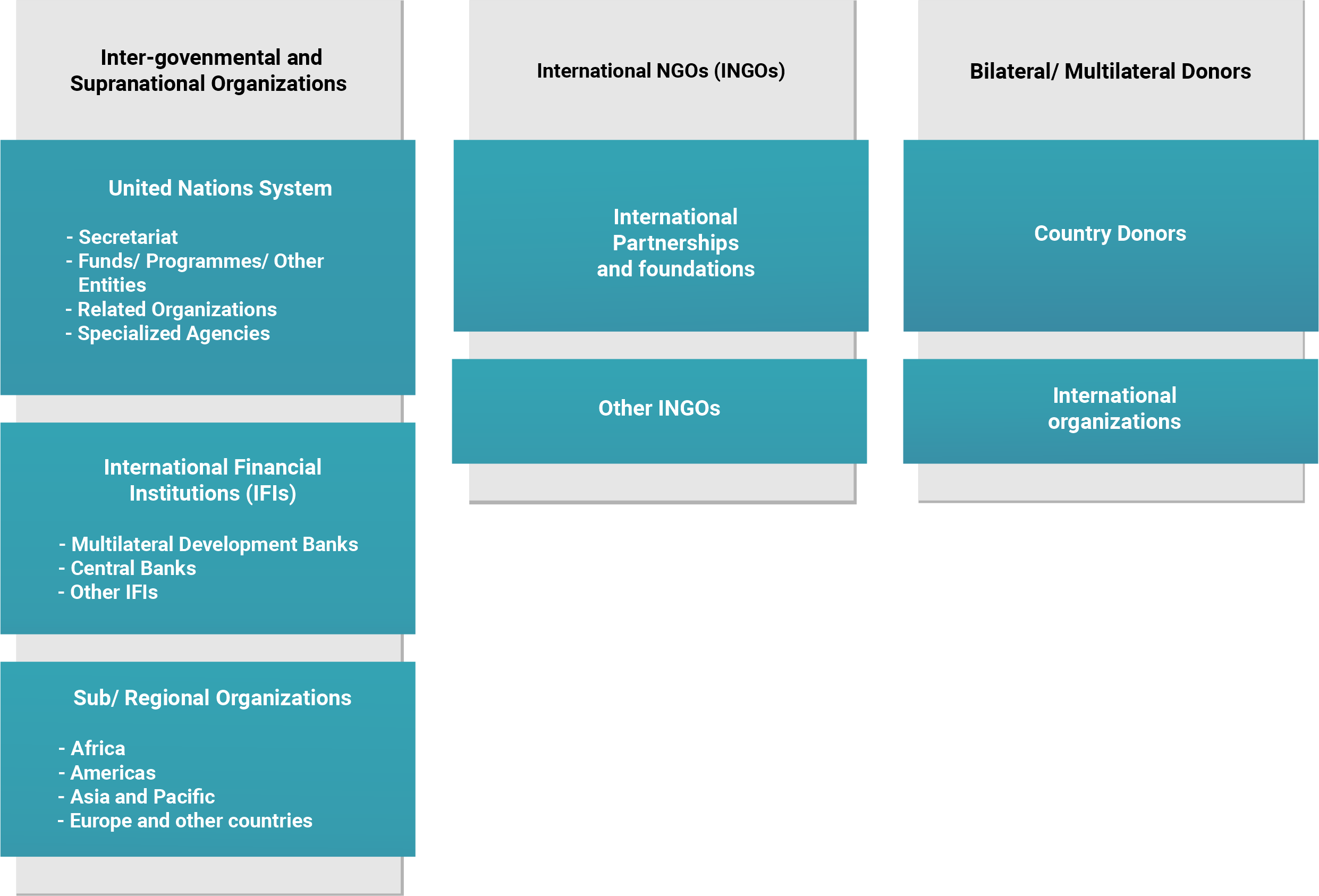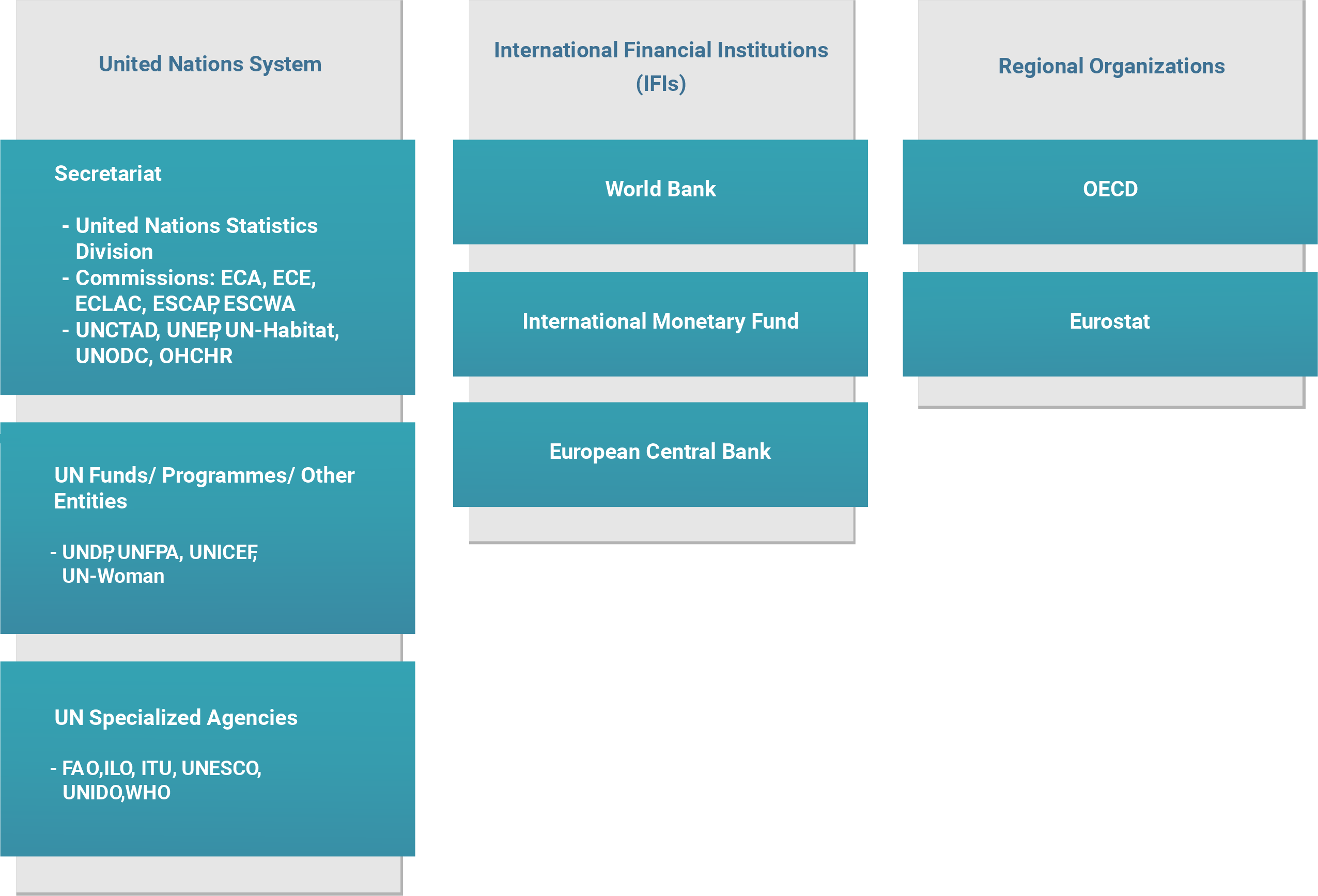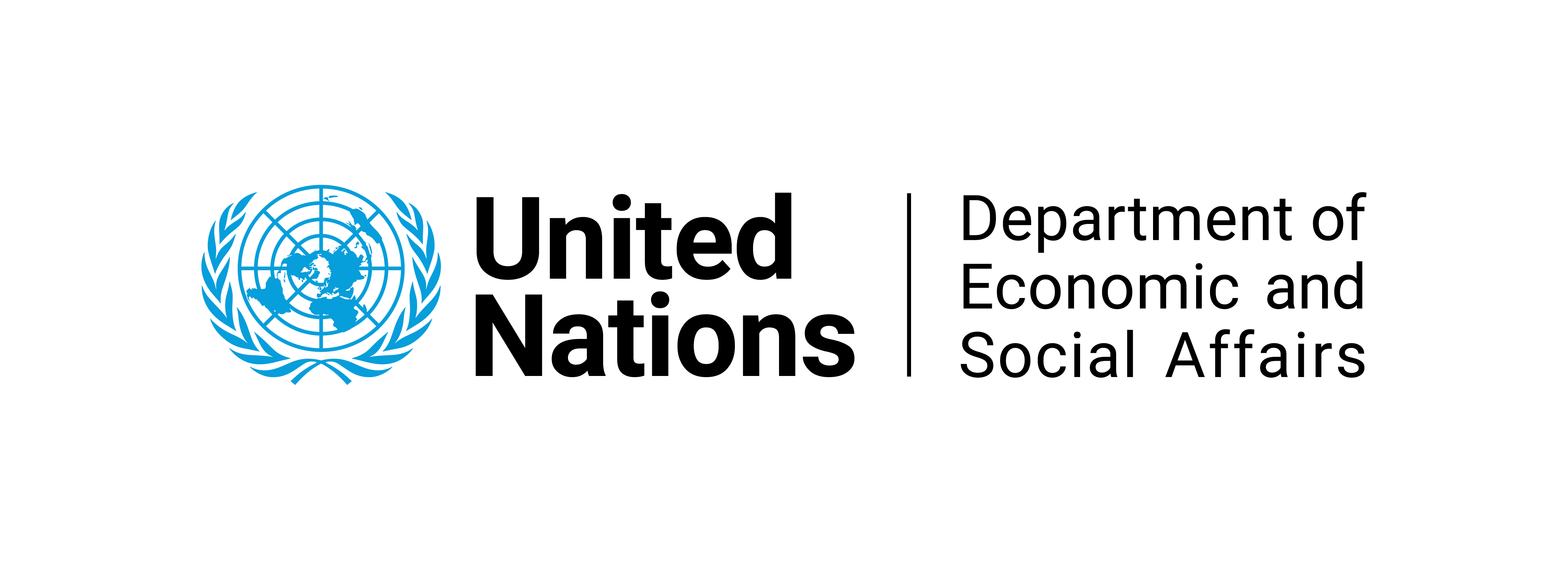17.1 Introduction and definitions#
17.1.1 The UNFPOS in the context of international statistical activities#
This chapter focuses on international statistical activities—who undertakes them, what they are and why they are undertaken.
It is structured to provide concise information and guidance on how national statisticians can implement principles 9 and 10 of the United Nations Fundamental Principles of Official Statistics (UNFPOS) through coordination, cooperation and collaboration mechanisms operating within the international statistical system:

UNFPOS 9: The use by statistical agencies in each country of international concepts, classifications and methods promotes the consistency and efficiency of statistical systems at all official levels.
UNFPOS 10: Bilateral and multilateral cooperation in statistics contributes to the improvement of systems of official statistics in all countries.
On UNFPOS 9, pages 80-90 of the Implementation guidelines of the UNFPOS (🔗) highlight that without common standards and metadata, comparability of data produced by different agencies would be impossible. This applies equally within a country and across countries.
Comparability is an important dimension of quality. If data are not comparable, they lose a lot of their utility. If data lose their utility, the organization that produces them loses relevance. It is also a key principle of work to modernise official statistics production and services that the use of common standards improves efficiency, both within individual agencies, and within the official statistics “industry” as a whole.
Therefore, the objective of the Fundamental Principle 9 is to ensure that official statistics (and their producers) remain relevant to users and provide good value for money to national governments. This principle further extends the scientific independence principles and standard related aspects of Principle 2: To retain trust in official statistics, the statistical agencies need to decide according to strictly professional considerations, including scientific principles and professional ethics, on the methods and procedures for the collection, processing, storage and presentation of statistical data.
Statistical frameworks discussed in earlier chapters of the handbook provide standards and requirements for sectoral statistics (e.g., SNA, environment, labour, gender), multi-sectoral statistics (including indicator frameworks such as that for the SDGs), and quality assurance for official statistics. As described in the current chapter, these products are the results of UNFPOS actions taken by national statistical systems and the international statistical system to implement 10 — bilateral and multilateral cooperation in statistics to improve systems of official statistics in all countries.
17.1.2 Definitions for purposes of this chapter#
Main definitions used in this chapter are listed hereunder and in the glossary at the end of the Handbook:
International statistical system (ISS) - the international organizations, or structural entities thereof, involved primarily or exclusively in developing, producing, and disseminating official statistics at global, regional and sub-regional levels. In principle organizations or structural entities within the ISS conform to the Principles Governing International Statistical Activities (🔗).
International organization (IO) - a body with an international membership, scope, or presence that promotes cooperation and coordination between or among its members. There are many types of international organizations. One way of categorizing them is to distinguish between intergovernmental organizations, supranational organizations and international non-governmental organizations.
Inter-governmental organization (IGO) - an international organization that involves two or more countries working on issues of common interest and that has been established by a treaty that acts as the charter founding the organization. The secretariat of an IGO is the organ that fulfils its central administrative or general secretary duties. The United Nations is an intergovernmental organization.
Supranational organization - an international organization with mandate, legislative power, and authority that goes beyond its member states’ boundaries. It differs from an intergovernmental organization in that within it, decisions are made by institutions specific to the organization, and not systematically by meeting of heads of state or their representatives. The European Union is one of the most prominent examples of a supranational organization.
Non-governmental organization (NGO) - an organization which is independent of government involvement. NGOs are a subgroup of organizations founded by citizens, including associations that provide services to their members and others.
International non-governmental organization (INGO) - a citizen-based organization independent of government involvement, with an international membership, scope, or presence, mobilizing resources and acting as implementer and catalyst to support its members and others.
International partnership (IP) - An international body established between inter-governmental organizations, supranational organizations, national bodies, corporations, philanthropic foundations and/or local and national civil society/non-governmental organizations working towards a similar or shared goal. It is common to consider INGOs and IPs as being part of the same category of international organizations. The Global Partnership for Sustainable Development Data is an example of an international partnership, and PARIS21 is an IP engaged in statistical capacity development.
International financial institution (IFI) - a financial institution (🔗) that has been established (or chartered) by more than one country, and hence is subject to international law (🔗). Its owners or shareholders are generally national governments, although other international institutions (🔗) and other organizations may be shareholders. The International Monetary Fund is an example of IFI.
Multilateral development bank (MDB) - an IFI, created by a group of countries, provides financing (🔗) and professional advising for development (🔗). MDBs can be global (e.g., World Bank) or regional (e.g., African Development Bank) in coverage.
17.1.3 Introduction to the international statistical system#
The international statistical system (ISS) comprises international or structural entities of international organizations involved primarily or exclusively in the development, production and dissemination of official statistics at global, regional or sub-regional levels. In principle, organizations or structural entities within the ISS conform to the Principles Governing International Statistical Activities (Refer to Box 12).
Box 12: Principles Governing International Statistical Activities
Bearing in mind that statistics are essential for sustainable economic, environmental and social development and that public trust in official statistics is anchored in professional independence and impartiality of statisticians, their use of scientific and transparent methods and equal access for all to official statistical information, the chief statisticians or coordinators of statistical activities of United Nations agencies and international and supranational organizations assembled in the Committee for the Coordination of Statistical Activities are implementing ten principles to enhance the functioning of the international statistical system.
Source: https://unstats.un.org/unsd/ccsa/principles_stat_activities/
The ISS and national statistical systems collaborate and voluntarily cooperate through various mechanisms on a wide range of areas and concerns covered in this Handbook, including:
development of statistical methodologies to address new data needs;
formulation and endorsement of internationally agreed recommendations on statistical standards, infrastructure, analytical frameworks, quality assurance frameworks, modernization models etc. and the relevant implementation manuals or guides;
technical cooperation and technical assistance in the adoption of internationally agreed recommendations;
coordinated capacity development of national statistical agencies and systems; and
systematic data flows, and exchange with enhanced comparability of official statistics and internationally agreed development indicators.
A broad overview of the categories of organizations comprising the ISS is depicted in Figure 22. Some key entities of the ISS are indicated in Figure 23. More detailed descriptions of the statistical mandate, domains, programmes and products, technical cooperation and capacity development activities of the various organizations are presented in subsequent sections.

Fig. 22 Main categories of international organizations in the ISS#

Fig. 23 Some key organizations of the ISS#
